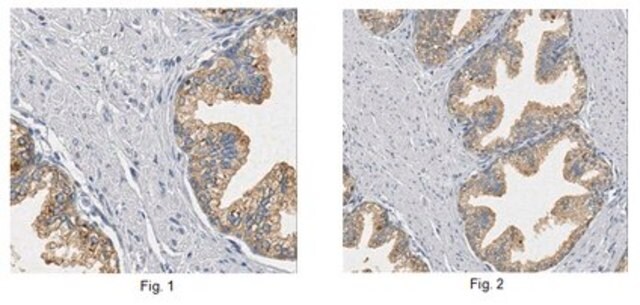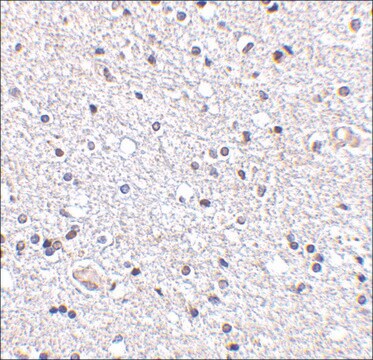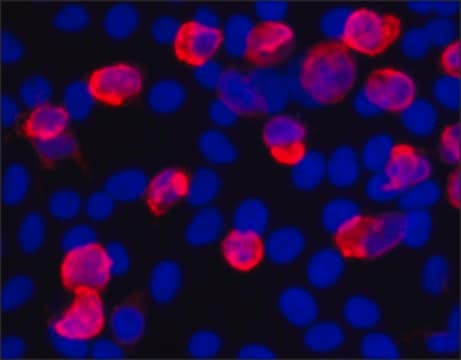おすすめの製品
由来生物
rabbit
品質水準
抗体製品の状態
affinity isolated antibody
抗体製品タイプ
primary antibodies
クローン
polyclonal
精製方法
affinity chromatography
化学種の反応性
mouse, human
テクニック
immunofluorescence: suitable
immunohistochemistry: suitable (paraffin)
western blot: suitable
UniProtアクセッション番号
輸送温度
wet ice
ターゲットの翻訳後修飾
unmodified
遺伝子情報
human ... TSLP(85480)
詳細
胸腺間質性リンパ球新生因子(TSLP)は最近、樹状細胞の成熟と活性化を促進できる重要な因子として特定されました。TSLPは4つのヘリックスバンドルを持つサイトカインで、主に上皮細胞バリアにより発現されており、骨髄樹状細胞などの複数の細胞型の強力な活性化因子です。TSLPは、制御性T細胞のポジティブ選択、末梢CD4+ T細胞恒常性の維持、CD4+ T細胞介在性アレルギー反応の誘発に関与しています。またTSLPは、胎児肝や成熟B細胞の前駆細胞の発達や、それらのB細胞発達のIgM陽性段階への分化をサポートすることもできます。TSLPは、心臓、肝臓、前立腺などの多数の組織で発現しています。
特異性
この抗体は、TSLPの中間ドメインを認識します。
免疫原
エピトープ:中間ドメイン
ヒトTSLPの中間ドメインに相当するKLH結合直鎖ペプチド
アプリケーション
このウサギポリクローナル抗体、抗TSLP抗体を用いた胸腺間質性リンパ球新生因子の検出は、ウェスタンブロッティング、IHC(パラフィン)、&免疫蛍光染色での使用が検証されています。
免疫組織染色:希釈倍率1:1,000で使用、ヒト前立腺がん組織および心臓組織においてTSLPを検出できます。
免疫蛍光染色: 20 μg/mLで使用、ヒト脳組織中のTSLPを検出できます。
免疫蛍光染色: 20 μg/mLで使用、ヒト脳組織中のTSLPを検出できます。
研究のカテゴリ
細胞構造
細胞構造
研究サブカテゴリー
分子接着(CAM)
分子接着(CAM)
品質
A20細胞ライセートにおいてウェスタンブロッティングにより評価されています。
ウェスタンブロッティング:2 µg/mLの本抗体は、15 µgのA20細胞ライセート中のTSLPを検出できます。
ウェスタンブロッティング:2 µg/mLの本抗体は、15 µgのA20細胞ライセート中のTSLPを検出できます。
ターゲットの説明
実測値:約23 kDa。 このタンパク質の分子量算出値は18 kDaですが、高度グリコシル化のため約23 kDaの位置に認められます。
物理的形状
アフィニティー精製抗原
精製ウサギポリクローナル抗体、0.1%以下のsodium azide含有するPBSバッファーに溶解。
保管および安定性
2~8°Cで受領日から1年間安定です。
アナリシスノート
コントロール
A20細胞ライセート
A20細胞ライセート
その他情報
濃度:ロットに固有の濃度につきましては試験成績書をご参照ください。
免責事項
メルクのカタログまたは製品に添付されたメルクのその他の文書に記載されていない場合、メルクの製品は研究用途のみを目的としているため、他のいかなる目的にも使用することはできません。このような目的としては、未承認の商業用途、in vitroの診断用途、ex vivoあるいはin vivoの治療用途、またはヒトあるいは動物へのあらゆる種類の消費あるいは適用などがありますが、これらに限定されません。
適切な製品が見つかりませんか。
製品選択ツール.をお試しください
保管分類コード
12 - Non Combustible Liquids
WGK
WGK 2
引火点(°F)
Not applicable
引火点(℃)
Not applicable
適用法令
試験研究用途を考慮した関連法令を主に挙げております。化学物質以外については、一部の情報のみ提供しています。 製品を安全かつ合法的に使用することは、使用者の義務です。最新情報により修正される場合があります。WEBの反映には時間を要することがあるため、適宜SDSをご参照ください。
Jan Code
ABT330:
試験成績書(COA)
製品のロット番号・バッチ番号を入力して、試験成績書(COA) を検索できます。ロット番号・バッチ番号は、製品ラベルに「Lot」または「Batch」に続いて記載されています。
Kathleen M Buchheit et al.
The Journal of allergy and clinical immunology, 137(5), 1566-1576 (2015-12-23)
Prostaglandin (PG) D2 is the dominant COX product of mast cells and is an effector of aspirin-induced respiratory reactions in patients with aspirin-exacerbated respiratory disease (AERD). We evaluated the role of the innate cytokine thymic stromal lymphopoietin (TSLP) acting on
Simon G Royce et al.
FASEB journal : official publication of the Federation of American Societies for Experimental Biology, 33(5), 6402-6411 (2019-02-16)
The airway remodeling (AWR) associated with chronic allergic airways disease (AAD)/asthma contributes to irreversible airway obstruction. This study compared and combined the antiremodeling and other effects of induced pluripotent stem cell and mesenchymoangioblast-derived mesenchymal stem cells (MCA-MSCs) with the corticosteroid
Simon G Royce et al.
FASEB journal : official publication of the Federation of American Societies for Experimental Biology, 33(5), 6402-6411 (2019-02-16)
The airway remodeling (AWR) associated with chronic allergic airways disease (AAD)/asthma contributes to irreversible airway obstruction. This study compared and combined the antiremodeling and other effects of induced pluripotent stem cell and mesenchymoangioblast-derived mesenchymal stem cells (MCA-MSCs) with the corticosteroid
Amlan Chakraborty et al.
Biomaterials, 273, 120796-120796 (2021-04-25)
Asthma (chronic allergic airways disease, AAD) is characterized by airway inflammation (AI), airway remodeling (AWR) and airway hyperresponsiveness (AHR). Current treatments for AAD mainly focus on targeting AI and its contribution AHR, with the use of corticosteroids. However, there are
Eda Ustaoglu et al.
Indian journal of dermatology, 68(2), 170-177 (2023-06-05)
This study aims to investigate the anti-inflammatory effects of cinnamaldehyde in atopic dermatitis (AD) in the mouse model. Twenty-four mice were divided into four groups: Group A (control), group B [AD with no treatment (AD + NoTre)], group C [AD
ライフサイエンス、有機合成、材料科学、クロマトグラフィー、分析など、あらゆる分野の研究に経験のあるメンバーがおります。.
製品に関するお問い合わせはこちら(テクニカルサービス)








